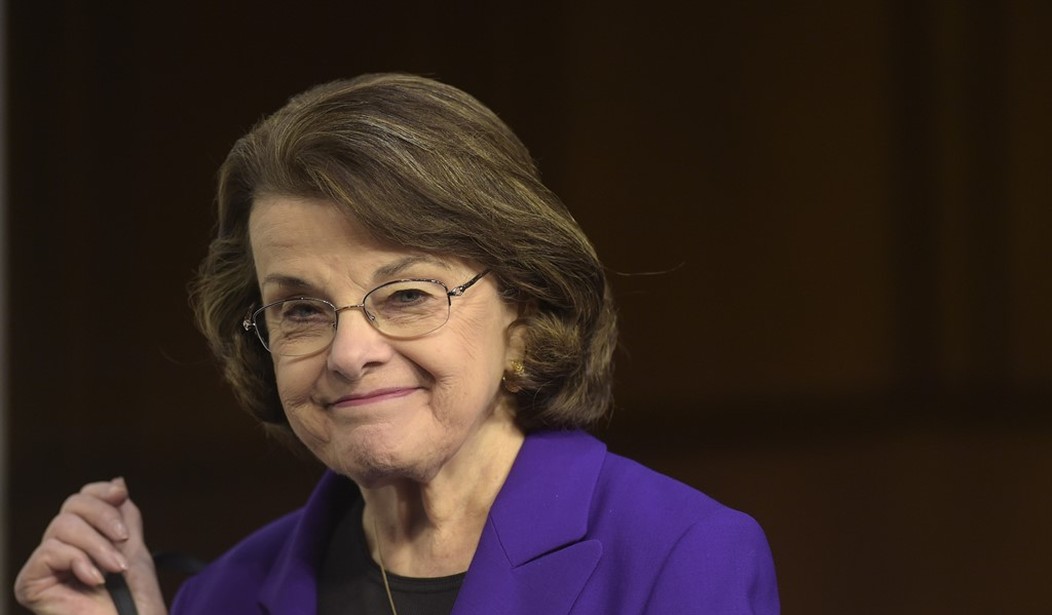The Senate held a hearing today on free speech on college campuses. There was a disagreement among the witnesses about how far campus administrators should go to protect speech in the face of determined efforts to shut it down. Law Professor Eugene Volokh argued that authorities must protect speech lest those trying to use the “heckler’s veto” learn that they can silence their opponents by making threats. But Sen. Dianne Feinstein disagreed, suggesting protection of the right to speak could result in another Kent State shooting.
After reading aloud the First Amendment in her opening remarks, Sen. Feinstein said, “The fact of the matter is that there are certain occasions on which individuals assemble not to act peaceably, but to act as destructively as they possibly can.” She went on to say, “When you have a set group of people that come to create a disturbance, some of them even wearing masks or wearing certain clothing, what do you do?” Feinstein said police aren’t always equipped to handle this situation making it “a horse of another color.” She concluded, “I do believe that the university has a right to protect its students from demonstrations once they become acts of violence.”
Professor Eugene Volokh disagreed with her during his testimony. “There are of course times, as Senator Feinstein pointed out, that the University isn’t trying to suppress speech because it finds it offensive but because enough people who are willing to stoop to violence find it offensive that there is then the threat of a violent reaction to such speech,” Volokh said. He continued, “But I tend to agree with Senator Cruz’s view that that kind of a heckler’s veto should not be allowed.
“The question was asked ‘When you have a set group of people who come to create a disturbance, what do you do?’ I think the answer is to make sure they don’t create a disturbance and to threaten them with punishment, meaningful punishment, if they do create a disturbance. And not to essentially let them have their way by suppressing the speech that they are trying to suppress.
“One of the basics of psychology that I think we’ve learned, and all of us who are parents I think have learned it very first hand, is behavior that is rewarded is repeated. When thugs learn that all they need to do in order to suppress speech is to threaten violence then there’ll be more such threats from all over the political spectrum. And I think the solution to that is to say that the speech will go on and if that means bringing in more law enforcement and making sure that those people who do act violently or otherwise physically disruptively that they be punished.”
A few minutes later, Sen. Dick Durbin pushed back by suggesting that college administrators had to consider the possible threats posed to campus by people with concealed weapons:
A few minutes later, Sen. Feinstein suggested that public campuses might not have the resources need to protect speech from the heckler’s veto. “How should a university handle this,” Feinstein asked the panel. Volokh responded saying, “If we are in a position where our police departments are unable to protect free speech…then yes indeed we are in a very bad position.”
“Professor, let me just understand what you’re saying,” Feinstein interrupted. She continued, “No matter who comes, no matter what disturbance the University has to be prepared to handle it…To me the extraordinary circumstance is when people come in black uniforms and hit other people over the head.”
Volokh replied, “Right, and that cannot be enough to justify suppression of those who they came to try to suppress.” As Volokh argued that protection from violence was a fundamental role of government, Feinstein replied, “You don’t think we learned a lesson at Kent State way back when?” This is a reference to an incident that took place in 1970 when national guardsmen opened fire on Vietnam war protesters, killing four people.
Professor Frederick Lawrence stepped in saying, “I think the way to start with this is with a strong presumption in favor of the speech, particularly if it’s speech that’s coming from a student group who has invited somebody.”
Sen. Feinstein replied, “No matter how radical, offensive, biased, prejudiced, fascist the program is? You should find a way to accommodate it.”
Lawrence replied, “If we’re talking about the substance of the program, not the danger and credible threats but the substance of the program, then yes.”
Feinstein genuinely seems to be missing the concept of the First Amendment. Of course, speech isn’t allowed or disallowed based on content. How does a Senator even suggest such a thing? And frankly, the idea that the campus shouldn’t be expected to protect speech on the grounds that it might incite others to violence is an endorsement of the heckler’s veto. It’s saying that as long as opponents of speech are willing to resort to threats, they can silence their opponents. That’s a horrible message for any American to endorse. I’m not surprised to hear this sort of thing coming from Evergreen College students, but I am surprised to hear it coming from a Senator.
You can see Professor Volokh’s statement on free speech at around 1:10:00 into this clip. Feinstein’s exchange with Professor Lawrence comes around 1:46:00.
https://www.youtube.com/watch?v=8tebmFmS0jY








Join the conversation as a VIP Member